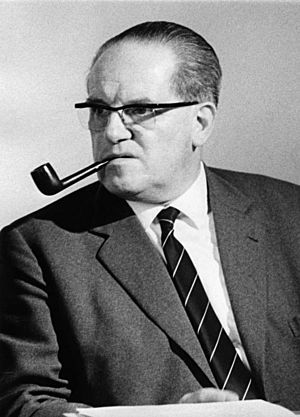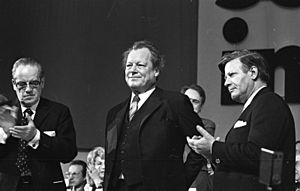Herbert Wehner facts for kids
Quick facts for kids
Herbert Wehner
|
|
|---|---|

Herbert Wehner in 1966, with his pipe
|
|
| Leader of the Social Democratic Party in the Bundestag | |
| In office 22 October 1969 – 8 March 1983 |
|
| Leader | Willy Brandt |
| Preceded by | Helmut Schmidt |
| Succeeded by | Hans-Jochen Vogel |
| Federal Minister of Intra-German Relations | |
| In office 1 December 1966 – 21 October 1969 |
|
| Chancellor | Kurt Georg Kiesinger |
| Preceded by | Johann Baptist Gradl |
| Succeeded by | Egon Franke |
| Member of the Bundestag Hamburg-Harburg |
|
| In office 14 August 1949 – 6 March 1983 |
|
| Preceded by | Parliament established |
| Succeeded by | Hans-Ulrich Klose |
| Personal details | |
| Born | 11 July 1906 Dresden, German Empire |
| Died | 19 January 1990 (aged 83) Bonn, West Germany |
| Political party | Social Democratic Party |
| Spouses | Lotte Loebinger Lotte Burmester Greta Burmester |
Herbert Richard Wehner (born July 11, 1906 – died January 19, 1990) was an important German politician. He was first a member of the Communist Party. After World War II, he joined the Social Democrats (SPD).
He served as the Federal Minister of Intra-German Relations from 1966 to 1969. After that, he became the leader of the SPD group in the Bundestag (the German parliament) until 1983.
During his time in the Bundestag from 1949 to 1983, Wehner was known for his strong and sometimes harsh way of speaking. He often argued fiercely with other politicians. He holds the record for the most official warnings given by the parliament's leader.
Contents
Early Life and Political Beginnings
Herbert Wehner was born in Dresden, Germany. His father was a shoemaker and active in his trade union and the Social Democratic Party. Herbert Wehner became interested in politics at a young age.
He joined the Communist Party of Germany (KPD) in 1927. He quickly rose through the ranks in the party. In 1930, he was elected to the state parliament of Saxony.
He later moved to Berlin to work with the KPD's main political group.
Life During World War II
When Adolf Hitler came to power in 1933, Wehner joined the communist resistance against the Nazi government. He had to leave Germany and went to Paris, then to Moscow in 1937.
While in Moscow, he lived through a difficult time for many people. In 1941, he was sent to neutral Sweden. He was arrested there in 1942 and held for a period. During this time, he was removed from the Communist Party.
Joining the Social Democrats
After returning to Germany in 1946, Wehner joined the Social Democratic Party (SPD) in Hamburg. He soon became a close helper to the party's leader, Kurt Schumacher.
In 1949, he was elected to the Bundestag parliament. He remained a member of parliament until he retired from politics in 1983. From 1952 to 1958, he was also a member of the European Parliament.
Wehner played a big role in the SPD changing its political ideas. The party moved away from strict Marxist beliefs to appeal to more people.
Minister and Party Leader
In 1966, Wehner became the Federal Minister for All-German Affairs. This was in a "grand coalition" government. A grand coalition is when the two largest political parties work together. In this case, it was the CDU and the SPD.

When the SPD took over the government in 1969, with Willy Brandt as Chancellor, Wehner became the leader of the SPD group in parliament. He was known for being a strict leader who made sure his party members followed the rules.
In 1972, the CDU tried to remove Chancellor Brandt from power. Wehner told the SPD members not to vote. This was to make sure everyone voted as planned and to prevent any surprises. The attempt to remove Brandt failed.
Later, during the 1973 oil crisis, Wehner felt that Brandt's policies were not strong enough. When a political scandal, the Guillaume Affair, led to Brandt's resignation, Wehner supported Helmut Schmidt to become the new Chancellor.
Wehner retired from politics in 1983. He passed away in 1990 in Bonn at the age of 83 after a long illness.
Wehner's Way of Speaking
Herbert Wehner was famous for his sharp and often insulting way of speaking in parliament. He would often use clever wordplay to make fun of his political opponents. For example, he called Helmut Kohl "Düffeldoffel."
He was often seen as a rival to Franz Josef Strauß, another powerful politician. Both were known for their strong speaking styles. Even though they were rivals, they worked together as ministers in the government of Kurt Georg Kiesinger.
Many politicians from other parties did not like Wehner's harsh words. However, some, like CDU politician Heiner Geißler, respected his strong commitment to his party's views. Geißler called him "the biggest parliamentary howitzer of all time." This meant he was a very powerful speaker.
See also
In Spanish: Herbert Wehner para niños
 | Madam C. J. Walker |
 | Janet Emerson Bashen |
 | Annie Turnbo Malone |
 | Maggie L. Walker |

